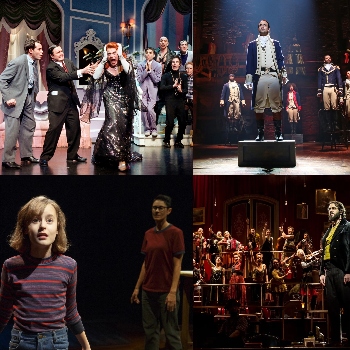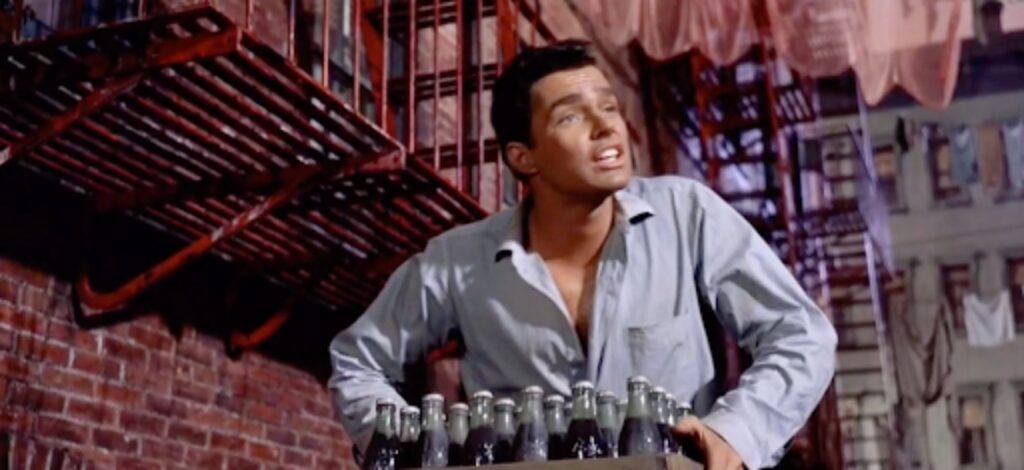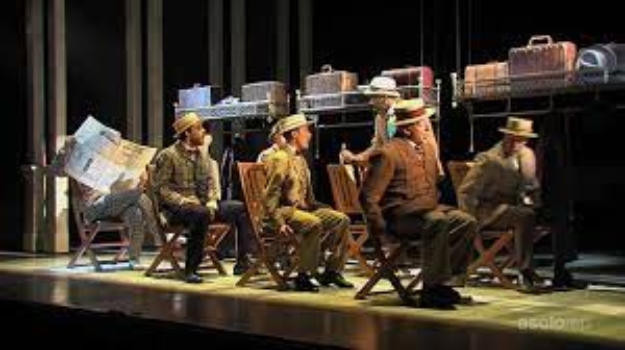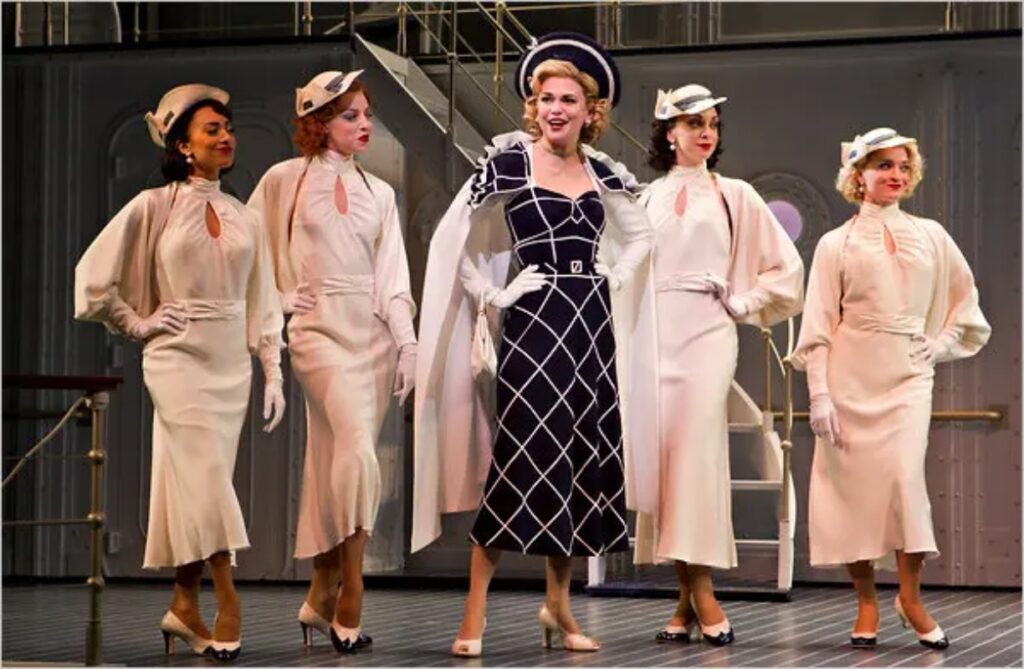
Last week, I found myself at coffee with a friend who had seen one of the industry presentations of Anne of Green Gables the musical, on which I had worked. He adored it, showering it with praise. One of the funniest compliments he gave me, though, was that he really enjoyed the show and identified with the themes and the characters despite having “not seen a musical in years” and “not really liking musicals to begin with.” If anyone reading this knows me or my writing at all, you likely know that this was a crack my knuckles and get down to business moment. I couldn’t resist.
I’ve had many such moments in my life. Some people just don’t like musicals! In fact, some people really hate them! I can remember nearly coming to blows with a friend of a friend at a party who said he really loved “straight plays” and “music of all kinds,” but “despised” all musicals. Another friend of a friend once told a group of us that he didn’t like “stories….in general” (let’s just agree that this person, who worked in, say it with me, finance, couldn’t be helped). Then there’s what I’ll call the “straight theatre snobs,” who seem to pooh-pooh anything that isn’t a three-hour, intermissionless adaptation of Faust, set during the reign of Ceaușescu and performed in an underground Brooklyn loft with no set (too specific?). Needless to say, I’ve found myself defending the gaudy, commercial, bold, and brassy art of musical theatre — and what I do for it, and why I love it — on more than one occasion.
However, I’ve found “defending musical theatre,” as a genre, to be a lot like describing or pinpointing why you love a person. Haven’t people asked you, “How did you know?” and all you can say in response is “I just knew…it was just a feeling.” Similarly, musical theatre was and is my first love…I can only describe my connection to it and love for it as chemical…something in me just latched onto it, understood it in my bones from the first musical I saw. The love affair has only grown deeper, and more joyful, and, yes, more complicated, from there.
But yes: I’ve done the academic legwork to explain it. I’ve written a lot on this platform about what musical theatre scholars call “the hierarchy of expression”: when you can’t speak anymore, you sing, when you can’t sing anymore, you dance. At the coffee shop with my friend, I used this theory to characterize musical theatre as the most expressive of the performing arts: when you’re watching a play, I said, the psychological underpinnings can’t be anything more than subtext, but when you’re watching a musical, you often know and understand exactly how a character is feeling because the genre allows the subtext to come to life through song and dance. I see song and dance as little windows into the characters’ souls.
Wagner described a similar phenomenon for opera (about which I’ve also written on this platform). He called it “gesamtkunstwerk,” or “total work of art,” believing that the arts had been unfairly “separated” during Greek antiquity. He sought to unite them once again, to allow audiences to better understand the piece, or the idea behind the piece as a whole. This was essentially a critique of “traditional,” pre-Wagnerian opera libretti, where the dramatic story and the music often felt like completely separate entities, and neither one did much to serve the other. Whatever you think of Wagner (and of course there’s a lot to think about this deeply anti-Semitic composer), he designed his operas such that the music and libretti served one another, as did the moments of dance/ballet, in order to express a complete whole. Musical theatre scholars have made the same suggestion about Rodgers and Hammerstein, saying that the famous team did for musical theatre what Wagner largely did for opera, uniting words, music, and dance in a symbiotic, expressive relationship.
Think about a musical like West Side Story, and the first notes Tony sings in the show. “Could be…who knows…” What an electric moment of expression, a little window into his soul (as I’d describe it), that the audience could only achieve via monologue otherwise. I know a great deal less about plays than I do about musicals, but it seems to me that after the 18th and 19th centuries, “modern drama” veered far into the world of naturalism, such that you rarely see a play today, unless it’s some sort of Brechtian, postmodern piece, that isn’t classically “natural,” the kind of play that gets lauded because it’s a window into how that situation or scene would have played out “in real life.” People leave those kinds of plays and say things like, “wow! I couldn’t believe I was watching a play! I got lost in there!”

By extension, that’s a criticism leveled at musical theatre a lot. My friend in the coffee shop kept saying “I just can’t lose myself in a musical.” I think a lot of people struggle with the inherent concept of musical theatre — people singing and dancing when they wouldn’t sing and dance in real life — which lends itself to a sort of “meta,” “unreal,” or, at worst, “fakey” quality.
Interestingly, that awareness — of the audience, of the actors, of the play, and vice-versa — is one of the other things I adore about musical theatre. I’ve written about this before, too: it’s why I love that vertical bed moment in Hairspray so much, it’s partially why I love A Chorus Line and Every Little Step. I even drafted an article (that did not make it past the cutting room floor) about why I love when choreographers or directors have actors bounce or have their hands up to create the sensation of riding a train or the subway onstage…a motion that virtuosic choreographer Ellenore Scott put into our Anne of Green Gables, and a choice I’ve tried to put into almost every single piece I’ve directed. Think about it: it comes up so much. I feel like almost every Golden Age musical I love has at least one subway scene (On the Town, Wonderful Town) where they do something like this; and while the latest revival of The Music Man put a real train car onstage for the famous first scene (they got that Barry Diller/David Geffen cash!) wherein the music imitates the movement of a train car (cassssshhhh for the merchandise; cassssh for the button hooks), the same effect is just as easily achieved if the actors “act out” the train movement themselves. In fact, you can guess my position as a director by now, but I’d argue it’s more effective than a physical train car, even if you have the money to put a gorgeous, period-specific train replica onstage. This way, we’re not even reaching for, or seeking, genuine naturalism, the creatives seem to dare the audience to recognize that it’s a musical, that the actors are telling a story. It seems to put in bold and underline, “THIS IS NOT REAL,” and thereby come to a place that is even more real, authentic, and creative. In other words, perhaps a “meta” train car, created by the actors within the context of a story, becomes more real than a real train car, or brings the audience to a higher understanding of their experience of a train.

As discussed, I’ve always loved these meta, tip of the hats that exist in musicals. The train car moment, the vertical bed, lines like, “no really, [you’re singing] like a professional,” from The Producers. I’ve written about how these performative, “meta” moments actually have their roots in the writings of Freud, Lacan, Garber, Wagner, and in vaudeville and even so-called “borscht-belt comedy.” So when people say they just can’t get behind the people “randomly singing,” or they just don’t find the experience “natural,” I say that it’s that inherent “meta,” “performative,” or “double” quality to musical theatre that makes it, to me, unique, appealing, and, perhaps most importantly, an incredibly complex and rich form of high art.
Lately, however, I feel like musical theatre has been defending itself from these critics. And I think that makes for uninteresting, un-musical, and rather “safe” art. Time and again critics, and message boards, have bemoaned the plethora of juke box musicals being produced on Broadway and beyond. One of the reasons I believe these types of musicals potentially appeal to the non-musical lover, beyond the fact that they’re filled with recognizable tunes, is because they upend this meta, “double,” or “gesamtkunstwerk” concept inherent to the musical theatre experience. If random pop or rock songs are shoved into random circumstances built by the song canon, and not vice versa, the songs are hardly “singing when you can’t speak,” reaching a higher plane of expression, or serving the story. Moreover, some of the most successful musicals on Broadway lately have been obsessed, in my opinion, with what I’ll call “the curse of naturalism,” where all of the sets have to be exactly life-like, and all of the acting has to appear like straight theatre acting, or worse, film acting. I mean, it’s why I’d take a Sutton Foster — whom many have accused of being too “broad” in her performances, or too “pingy” vocally — over some of our smaller, more naturalistic Broadway performers any day of the week. She has that stage presence, that twinkle in her eye that, in my opinion, can only come in musicals, and seems to say, “I know I’m performing, you know I’m performing, look at me anyway.” An “I love the audience, the audience loves me, and we all love each other” (as Roxy says in Chicago) moment. If brassy, big, and expressive songs come out of super naturalistic, “fly on the wall” performing, they will actually feel disjointed, like they’re “coming out of nowhere,” as my coffee shop friend would say.

The phenomenon is true for movie musical adaptations too: much was made of the fact that the Mean Girls the musical trailer, which came out in November, basically hid the fact that it had original songs or was a musical in any way (check out the article my friend, and former podcast guest, Chris Murphy, wrote about the phenomenon for Vanity Fair). In general lately, I feel like musicals, movie musicals, or anything that might happen to suspend naturalism and give us a good, old-fashioned song and dance breakout moment, has been afraid of its own shadow, masquerading as something that it’s not. And, in my opinion, that makes for shallow, safe, boring, and, frankly, weak art.
I get it: economically, theatre is struggling, art is struggling, and marketers and producers think it’s smart to appeal to as wide an audience as possible. And, as discussed above, there are quite a lot of people in the world who hate, or just don’t get, musical theatre. But I think what the powers that be forget, however, is that for every one “I don’t get transported by musicals” or “I hate stories” person, there’s another person, perhaps a young person, who is forever changed, for whom a musical, for whatever reason, exactly tickles their fancy.
What’s more, as discussed above, I think leaning into what a musical inherently is, even embracing what some might see as the “weirdness” or “fake” aspects of musical theatre, makes for more interesting, exciting, and groundbreaking art. I think, for example, about the new musicals that most excited me from the last decade or so in New York: Natasha, Pierre, and the Great Comet, The Drowsy Chaperone, Hairspray, Fun Home, Hamilton, even the Anne of Green Gables I just worked on (which I absolutely adored), and the movie musicals I loved from the last few years (In the Heights, West Side Story). What they all have in common is an inherent theatricality, a desire to explore that meta space, or that “doubleness,” that makes musical theatre so unique, whether it’s a change in stage perspective and unabashed camp (Hairspray), the ultimate show-within-a-show (The Drowsy Chaperone), or the use of directing/choreography/stagecraft to create and dismantle worlds (Hamilton, Natasha Pierre). Musical theatre does best when it stops apologizing for itself and explores the limits and boundaries of its own conceit. Some people might hate it, but, hey, the show must go on.


Another well written, well researched essay! And I feel just as the writer does about musical theater! I find the song and dance transporting, exhilarating, joyous! And the lyrics, as in several Rogers and Hammerstein and many Stephen Sondheim musicals are brilliant . They express thoughts musically that would otherwise be quite routine! I love “straight” plays as well, and have seen many, but nothing makes me feel transported as a musical does! I’m so glad the show must go on!
,
,
Thank you!